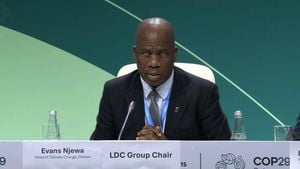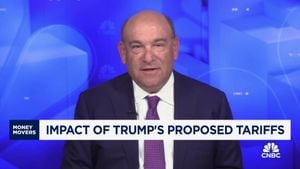The 2024 elections revealed significant shortcomings within the Democratic Party's campaign strategy, particularly when it came to connecting with voters and addressing their concerns. With two key events—Joe Biden's lackluster debate performance and Representative Dean Phillips's departure from the party line—pivotal questions arose about how the party can regain trust and redefine its approach actively.
First, let’s take a step back to the dramatic moments of the June 27 debate between President Joe Biden and former President Donald Trump. This event marked the beginning of the end for the Democrats' carefully crafted narrative around Biden’s fitness for office. For years, the party and its supporters dismissed observations of Biden's gaffes and physical obstacles. White House Press Secretary Karine Jean-Pierre described concerns about Biden as “cheap fakes” and “disinformation.” Mainstream media figures echoed this refrain, with many downplaying doubts about the President’s capabilities right until the debate.
Yet the debate shattered this illusion. Americans tuned in and witnessed one of Biden's most dismal performances. His mental clarity and physical poise were visibly compromised. This public display led many to question not just Biden's capabilities but also the extent to which the Democratic apparatus had been misleading them about significant issues. The aftermath saw shifts in public sentiment; record low trust levels were reported within the media, as nearly 70% of Americans expressed either no confidence or very little trust at all.
Shortly after the debate, the party witnessed another shocking event: an assassination attempt on Donald Trump. While such incidents typically serve as fodder for political rhetoric, this event transformed the public's perception. Long-standing Democratic narratives labeling Trump as a rise-of-fascism specter backfired. Voters began to see Trump not just as the incarnation of extremism but as someone facing genuine threats. Trump's defiance, post-incident, rallied his supporters, making them more resolute, coupled with growing skepticism toward the Democrats' rhetoric.
Meanwhile, within the party ranks, concerns were brewing, especially highlighted by Phillips. Once firmly placed within the Democratic leadership, Phillips decided to take the plunge and challenge Biden for the presidential nomination. His rationale? He believed Biden's choice to seek re-election laid the groundwork for certain defeat against Trump. "I think it’s the same result, because, again, we chose to ignore people’s voices," Phillips noted, emphasizing the pressing need for change inside the party.
Phillips's remarks raise questions about the party’s structural integrity. He articulated his disappointment over what he perceived as the Democratic Party turning away from its foundational principles—namely, prioritizing democratic openness and competition over obedience to established insider politics. He pointed out how state party officials colluded with the Democratic National Committee to prevent rising candidates from making their mark. What should have been a spirited debate became, as he put it, effectively spliced down to candidates without competition, risking the party's relevance and cohesiveness.
Referring to the party’s internal debates, Phillips expressed concerns about lack of genuine democratic processes. "A primary process should be a primary process. This past season was anything but," he underscored. He favored mandatory debates among all candidates to let voters witness discussions and determine the most suitable candidates early on. This notion springs from the belief many share: open competition could lead to stronger candidates capable of engaging voters' needs.
His stance reflected how Phillips believed the Democrats failed to learn from their 2016 losses—where voters felt far removed from the campaign's elite messaging. He noted, "We have to [return] to more transparency and more exposure and more debate," reiteratively supporting the idea of open, competitive, and spirited primaries.
Adding to the discontent within the party, Phillips confronted the post-election reality, highlighting the internal divisions concerning Vice President Kamala Harris’s rise to be the presumptive nominee once Biden withdrew. Many felt she lacked the momentum and public support necessary to rally the party effectively. “Yes. It’s what former President Obama indicated was important,” said Phillips, arguing there should have been opportunities for other potential candidates to prove themselves under the electoral spotlight.
But taking it even farther, Phillips's criticisms extend beyond procedural changes. He emphasized the dire need for the party to transform its messaging. Many voters today perceive the Democratic Party as predominantly offering condemnation rather than crafting invitations for collective unity. This attitude, as cited by Phillips, often leads to significantly weakened electoral support.
Regarding the 2024 election results—particularly coaching Harris's performance against Trump—Phillips observed how Democrats faced sweeping rejection from the electorate. This reality prompts discussions about whether the party should reconsider its approach, particularly concerning socially and culturally rooted concerns of families feeling alienated. Phillips aligned with Senator Bernie Sanders's perspectives on how the party must reckon with this sense of cultural disconnect among working-class Americans.
Democrats have faced backlash for certain topics like “defunding the police.” While the dialogue over law enforcement is relevant, the phrasing tied them to widespread disapproval among the general populace, damaging the party's image tremendously. Phillips aptly stated, “Bidenomics was about as poor packaging and branding as you could possibly come up with,” recognizing the party must fine-tune its approach to resonate positively with the American public.
These reflections cast doubt on the Democrats' ability to mobilize effectively heading toward future elections, paralleled by their recent experiences. They grapple with establishing meaningful outreach to voters, proving willing to adapt to their changing reactions and expectations.
Zooming back to Phillips, he encapsulated the urgency for transformation within the party: “We need to improve both messengers and messages,” he stated, asserting this adjustment is imperative if the Democrats want to win again. The core challenge rests not only on which candidate attempts to lead but also how effectively they can connect and resonate with voters about the issues they care about.
Now, the question on everyone’s mind is whether the Democratic Party can successfully course-correct before the next election. Phillips’s insights, alongside the fallout from the debates and the realities of the party’s missteps, paint a challenging, but potentially transformative pathway forward—if they choose to heed these warnings.



